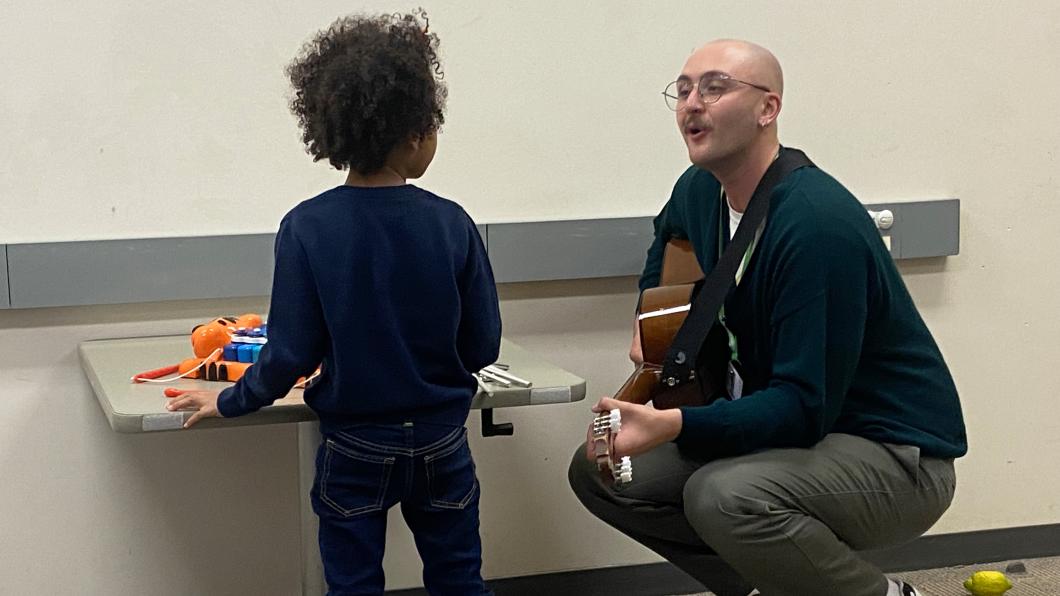
In music therapy, 'there are no wrong notes'
By Louise Kinross
Music therapist Jack Stevens recalls a fond memory of one of the children he worked with at Holland Bloorview. “When I met her she wouldn’t speak to me, or to her parents in the room,” he says. “But by the end of the 10 weeks, she was grabbing the microphone from me and singing her heart out to Disney songs at full volume.”
Jack came to Holland Bloorview in 2022 as a music therapy student from Wilfred Laurier University. Since the spring he’s been working here as a music therapist part-time. But his connection to the hospital goes way back.
“I grew up in a family where I was a sibling of someone with a disability,” he says. “My sister Ruby was a regular here in the Autism Research Centre. I saw how difficult it can be growing up with a disability, not only for the person, but as a family member as well. I had a quasi-parental role with my sister, who was four years younger than me, and I didn’t realize until recently how it’s shaped my view of the world. I’m very much a caregiver kind of person, and wanting to help people is a big passion of mine.”
Jack chose a career that combined his desire to help others with his love of music. “I grew up playing guitar from the age of six,” he says. “My parents thought I was too shy and needed something to hide behind so I could make friends. It did actually work.”
He went to high school for musical theatre and then on to a new community music program at Laurier. “It was more focused on how does music make you feel, how can it evoke social change, how can you use it in your everyday life, and how can we make it more accessible,” he says. This was a departure from his music lessons growing up, which were about practising with sheet music until you could play a piece perfectly.
Today, “it’s watching kids get to explore and play wrong notes—because there are no wrong notes,” that brings him the most joy. “I want them to dive completely into the creative process and learn what sounds they like and how fast or slow they want to play.”
Jack runs a number of groups at Holland Bloorview designed for toddlers up to young adults. Glee focuses on singing popular and musical theatre songs and Accentuate the Positive is more exploratory and creative, playing rhythm games with drums or creating a sonic environment. “One client takes the subway every day and wanted to recreate the sounds of the subway train,” Jack says. “There were whistles, bells and drums to mimic the train on the track.”
Children work on a variety of goals, including improving their social, gross and fine-motor skills. “I’ve found a lot of people who are in and out of hospitals become used to their treatment being done to and for them, and my philosophy is I want to make it fun,” Jack says. “I want them to know I’m doing this with them, it’s a collaborative effort, and there’s often a shift in sessions when they realize ‘I have a say in what’s going on here.’”
Being flexible is important. “When you’re working with kids, things don’t always go as planned,” Jack says. “Within the first five minutes I may have to throw out the entire session I’d planned because a child wants to do something different.” Debriefing with other music therapists who are also early on in their career helps. “It’s nice to go into the office and say ‘Guys, guess what just happened?’”
Jack works out at a club three to four times a week as a way of managing stress. “It helps me calm myself and get that extra energy and emotion out.”
Jack’s sister Ruby, who has autism and a physical disability, just won a gold medal at the Parapan American games in Santiago for Canada’s para swim team. “I’m her number one fan and we were there crying in the stands,” he says.
Growing up, Jack didn’t meet other siblings of kids with disabilities. He didn’t know it was common for siblings to feel left out when so much attention goes to their brother or sister. “It’s only recently I’ve recognized that I’m also an individual with needs and wants and desires and they are just as important,” he says. “I’m allowed to exist outside my family and that’s been a big struggle for me.” He participates in a group chat with other adult siblings for support. “I find a lot of comfort in knowing it’s okay for me to feel the different emotions I do, and to know other people have had similar experiences.”
In addition to working with kids at Holland Bloorview, Jack has contracts with long-term care facilities and group homes. But he enjoys working with children the best. “With kids it’s acceptable to be a little sillier. I joke all the time and I can bring more of myself into a session when I’m working with younger people. That fills my cup.”
Like this story? Sign up for our monthly BLOOM e-letter. You'll get family stories and expert advice on raising children with disabilities; interviews with activists, clinicians and researchers; and disability news.